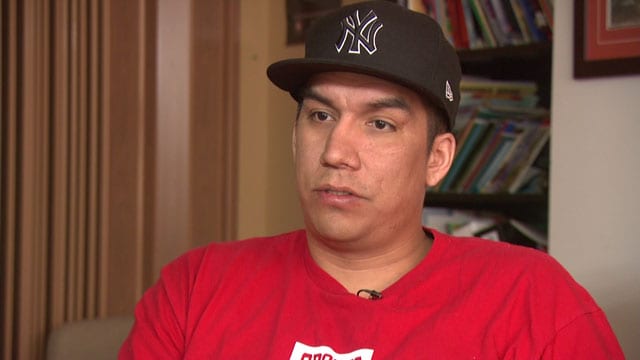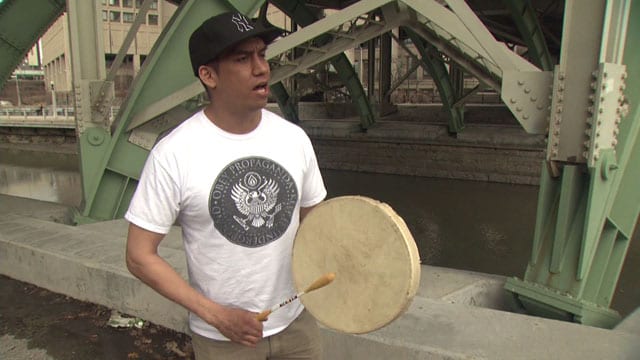The scars on Randy Kakegamick’s face tell the story of his life.
Like the one over his left eye when a stranger attacked him unprovoked he said near Bank Street in Ottawa.
He was just a little boy then and woke up in a pool of his own blood.
Drinking had torn his family apart and at night, when lonely, he’d walk the streets pretending to be a superhero.
“There were times when I would be alone and I would just wander the streets – get out and try not to be so lonely,” said Kakegamick, 39.
Those are the scars he’ll talk about.
It’s the ones that cut deepest he won’t just tell anyone.
But that is what the Ontario government is asking him to do.
Kakegamick recently pleaded guilty to assaulting an ex-girlfriend last year.
The Crown wants to put him in the local jail for six months.

The judge has ordered a Gladue report that will detail Kakegamick’s life growing up as a First Nation man and what led him to court.
The report will also outline services in the community that are available to help Kakegamick stay away from trouble and get his life together.
Typically, the government requires a court-appointed writer in Ottawa do the report.
But Kakagamick, who is from North Spirit Lake, is requesting a different writer – someone he knows and trusts.
“If they say you got one day to meet this person to get into your deepest darkest secrets of your life, I don’t think that will happen,” he said. “I wouldn’t be honest. It takes time to build that trust with somebody.”
He’s built that trust with Mark Marsolais, a First Nation man who also writes Gladue reports in the nation’s capital.
“This is a sacred story of an individual,” said Marsolais. “There are two sides to a Gladue. It’s not just about a westernized lens and showing the courts what this person is about from an individual standpoint. It’s also a report that helps an individual on their healing journey sometimes for the first time. They get to self-reflect and see about themselves.”
He’s waiting on Legal Aid in Ontario to decide if his wish to talk to Marsolais will be granted.
It’s not clear how the judge will react if Kakegamick refuses to speak to a court-appointed writer.
Meanwhile, Kakegamick continues on his journey.
He said most of his legal troubles over the years were the result of his drinking. He got into a treatment program at the Ottawa Mission after his latest arrest and has been sober now for several months.
“This is the longest I have ever been sober since I was 16. It’s just over five months and I’m 39 years old now so that is quite a feat for me,” he said.
He said drinking destroyed his parent’s marriage when he was about six-years-old.
“Drinking involves hurt, sorrow and the failure of my family,” he said.
It’s also hurt his son, even if the young boy is too young to know it.
All those times Kakegamick was away behind bars he could hear how his son missed him and needed his dad around but thought he was away working.
He’s trying to make amends for that now.
In doing so, he’s finding his son is helping him.
“I’ve been spending a lot of time with him. He’s a big help. He doesn’t know it but he’s a big help,” he said.
While he waits to learn who will write his Gladue next month, and if a judge will put him back behind bars, he focuses on the small things that keep him sober.
Like running on a treadmill every day to keep ahead.
Yet, rooted in his culture to be an example for his son.

It’s Kakegamick’s journey to be a better man.
The rocky past was the river and the future is the sea.
The waters may be calmer now.
But he knows he needs to stay in the boat.










Mi Tawa washte mi hokshila. My own good son! Leh Lakota Weon loves You Randy Kakegamick!
In my work experience, the story feature of Randy Kakegamick wanting to tell his life journey is an important step to share about himself. Storytelling runs in our blood. It’s part of our DNA from Native tradition. Each story shared belongs to the teller.
The story helps educate, advocate, and bring awareness to people making policy or or funding decisions. As Native people, we need a lot of that. We need to reach into people’s minds and bring awareness, and reach down…into their heart so they have that compassion for other human beings.
One of the keys to healing is holding ownership of one’s own story. People need to feel in control of their own healing process. You share the story with people closest to you, then you expand. You build that trust, safety, then you continue to have that safety expand so you can build hope and healing every day.
Although stories are about abuse and trauma, they also are about healing, resilience, and love.
They don’t just focus on statistics and disparities. They focus on the innate strength and resilience we have as Native People. It’s rising against all odds. It’s rising, putting one foot in front of the other, no matter where the path took us and where it will lead us.
Stay strong Randy praying for you buddy❤